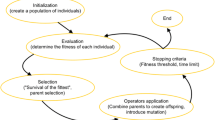Abstract
Computational social science in general, and social agent-based modeling (ABM) simulation in particular, are challenged by modeling and analyzing complex adaptive social systems with emergent properties that are hard to understand in terms of components, even when the organization of component agents is know. Evolutionary computation (EC) is a mature field that provides a bio-inspired approach and a suite of techniques that are applicable to and provide new insights on complex adaptive social systems. This paper demonstrates a combined EC-ABM approach illustrated through the RebeLand model of a simple but complete polity system. Results highlight tax rates and frequency of public issue that stress society as significant features in phase transitions between stable and unstable governance regimes. These initial results suggest further applications of EC to ABM in terms of multi-population models with heterogeneous agents, multi-objective optimization, dynamic environments, and evolving executable objects for modeling social change.



Similar content being viewed by others
References
Almond GA, Powell GB Jr, Dalton RJ, Strom K (2006) Comparative politics today: a world view. Longman, New York
Axelrod R (1997) Advancing the art of simulation in the social sciences. Complexity 3(2):193–199
Cantù-Paz E (2001) Migration policies, selection pressure and parallel evolutionary algorithms. J Heuristics 7(4):311–334
Chattoe E (1998) Just how (un)realistic are evolutionary algorithms as representations of social processes? J Artif Soc Soc Simul 1(3). Available online
Chattoe E, Gilbert N (1997) A simulation of adaptation mechanisms in budgetary decision making. In: Conte R, Hegelsmann R, Terna P (eds) Simulating social phenomena. Springer, Berlin
Cioffi-Revilla C (2005) A canonical theory of origins and development of social complexity. J Math Soc 29(April–June)
Cioffi-Revilla C (2010) On the methodology of complex social simulations. J Artif Soc Soc Simul 13(1):7. Available online
Cioffi-Revilla C, Rouleau M (2010) MASON RebeLand: an agent-based model of politics, environment, and insurgency. Int Stud Rev 12(1):31–46
De Jong K (2006) Evolutionary computation. MIT Press, Cambridge
De Jong K (2009) Evolutionary computation. Wiley Interdiscip Rev (WIREs) Comput Stat 1(1):52–56
Deb K (2001) Multi-objective optimization using evolutionary algorithms. Wiley, New York
Epstein J (2006) Generative social science: studies in agent-based computational modeling. Princeton University Press, Princeton
Gilbert N (2008) Agent-based models. Sage Publishers, Thousand Oaks
Gilbert N, Troitzsch K (2005) Simulation for the social scientist, 2nd edn. Open University Press, Buckingham and Philadelphia
Hansen N, Müller SD, Koumoutsakos P (2003) Reducing the time complexity of the derandomized evolution strategy with covariance matrix adaptation (CMA-ES). Evol Comput 11(1):1–18
Holland J (1986) Escaping brittleness: the possibilities of general purpose learning algorithms applied to parallel rule-based systems. In: Michalski R, Carbonell J, Mitchell T (eds) Machine learning II. Morgan Kaufmann, San Mateo, pp 593–623
Kluger J (2008) Simplexity: why simple things become complex (and how complex things can be made simple). Hyperion, New York
Liu J, Dietz T, Carpenter SR, Alberti M, Folke C, Moran E, Pell AN, Deadman P, Kratz T, Lubchenco J, Ostrom E, Ouyang Z, Provencher W, Redman CL, Schneider SH, Taylor WWA (2007) Complexity of coupled human and natural systems. Science 317(5844):1513–1516
Lomborg B (1996) Nucleus and shield: the evolution of social structure in the iterated prisoner’s dilemma. Am Sociol Rev 61(2):278–307
Nolfi S, Floreano D (2000) Evolutionary robotics: the biology, intelligence, and technology. MIT Press, Cambridge
Ostrom E (2009) A general framework for analyzing sustainability of socio-ecological systems. Science 325:419–422
Parisi D, Cecconi F, Cerini A (1995) Kin-directed altruism and attachment behavior in an evolving population of neural networks. In: Gilbert N, Conte R (eds) Artificial societies: the computer simulation of social life. UCL Press, London, pp 238–251
Rapoport A (1970) N-person game theory: concepts and applications. University of Michigan Press, Ann Arbor
Rennard J-P (ed) (2006) Handbook of research on nature inspired computing for economics and management. Idea Group Inc, Hershey
Reynolds RG (2008) Computing with the social fabric: the evolution of social intelligence within a cultural framework. IEEE Comput Intell 3(1):18–30
Reynolds RG, Lazar A, Kim S (2002) The agent-based simulation of the evolution of archaic states. In: Macal C, Sallach D (eds) Proceedings of the agent 2002 conference on social agents: ecology, exchange, and evolution, University of Chicago and Argonne National Laboratory, Chicago
Reynolds RG, Ali M, Jayyoussi T (2008) Mining the social fabric of archaic urban centers with cultural algorithms. Computer 41(1):64–72
Ritter HWJ, Webber MM (1973) Dilemmas in a general theory of planning. Policy Sci 4:161–167
Sarma J (1998) An analysis of decentralized and spatially distributed genetic algorithms. Ph.D. Thesis, George Mason University
Schultz AC, Grefenstette JJ, De Jong KA (1993) Test and evaluation by genetic algorithms. Intell Syst 8(4):9–14
Simon H (1996) The sciences of the artificial. MIT Press, Cambridge
Takadama K, Cioffi-Revilla C, Deffaunt G (eds) (2010) Simulating interacting agents and social phenomena: the second world congress in social simulation. Springer, Tokyo
Terano T, Sallach D (eds) (2007) Advancing social simulation: the first world congress in social simulation. Springer, Tokyo
Author information
Authors and Affiliations
Corresponding author
Additional information
Funding for this study was provided by the Center for Social Complexity at George Mason University and by grant no. N00014-08-1-0378 from the Office of Naval Research. The authors are solely responsible for any errors in this study. Special thanks to Mark Rouleau for initial development of the MASON RebeLand model with the first author, to Sean Luke for support with the MASON system, and to members of the Mason-HRAF Joint Project on Eastern Africa for comments and discussions.
Rights and permissions
About this article
Cite this article
Cioffi-Revilla, C., De Jong, K. & Bassett, J.K. Evolutionary computation and agent-based modeling: biologically-inspired approaches for understanding complex social systems. Comput Math Organ Theory 18, 356–373 (2012). https://doi.org/10.1007/s10588-012-9129-7
Published:
Issue Date:
DOI: https://doi.org/10.1007/s10588-012-9129-7




